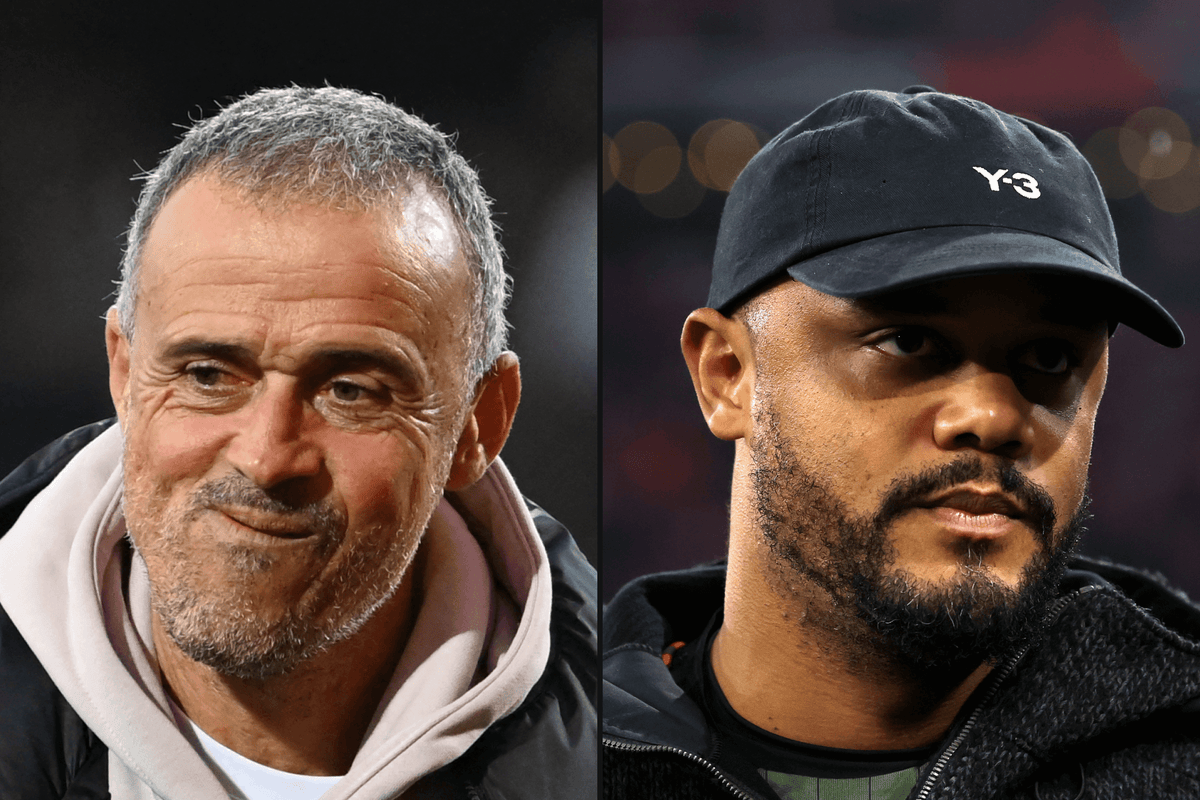There’s no doubt about which domestic football league is the strongest. UEFA’s coefficient model, which assesses performance over five seasons, has the Premier League a considerable distance ahead of every other competition — and it has topped the seasonal rankings in five of the last six campaigns.
It’s a similar story when you look at Opta’s Power Rankings, which assess more than 10,000 men’s teams across the globe. Premier League sides make up 12 of the top 20, with Brentford currently rated higher than reigning Serie A champions Napoli. You did not get that scenario in Diego Maradona’s heyday.
But there are two non-Premier League sides in Opta’s top five, and they meet tonight (Tuesday, November 4) at the Parc des Princes. Paris Saint-Germain are the reigning European champions, having ended their long wait to lift the Champions League trophy in May, thrashing Inter 5-0 in the final. Bayern Munich, meanwhile, have won every single game — in all competitions — they have played this season. That run of 15 successive wins from the beginning of a season is the best-ever start in any of Europe’s traditional big five leagues.
They also lie first and second in the Champions League table after three games, so it seems fair to ask: is Tuesday night’s game the meeting of European football’s two best teams? Liam Tharme and Seb Stafford-Bloor make a case for each side.
Paris Saint-Germain
Three Champions League games in 2025-26 have been smooth enough sailing for Paris Saint-Germain, as they look to become the first team since Real Madrid in 2018 to defend a European crown.
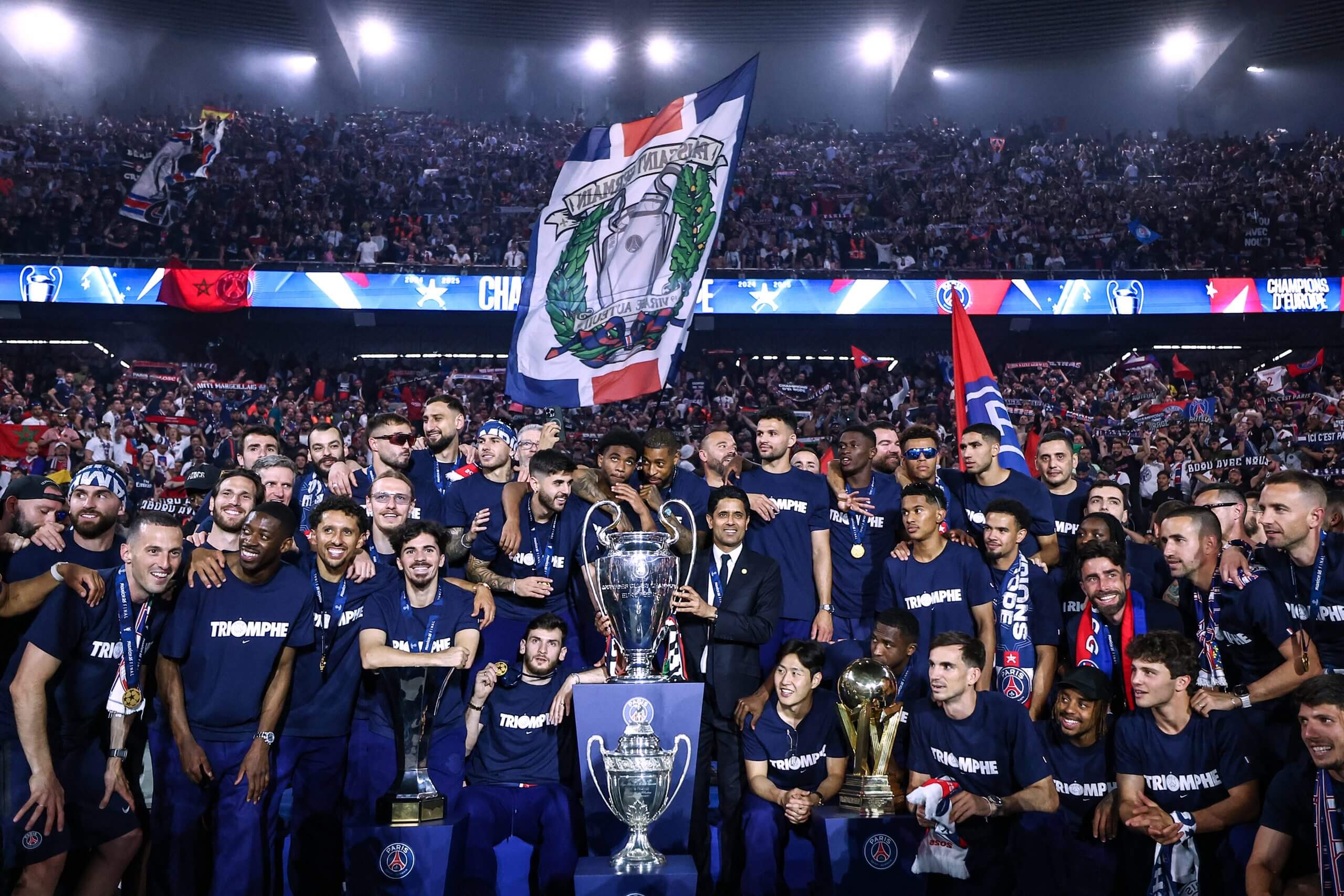
(Franck Fife/POOL/AFP via Getty Images)
They had Atalanta dispatched by half-time on matchday one, running out 4-0 winners, and most recently smashed Bayer Leverkusen 7-2 at the BayArena, thanks to a mix of excellent finishes and scything attacks.
Between those came a statement win away at Barcelona in Montjuic.
A late Goncalo Ramos goal snatched three points there, a sign that PSG have every type of attacker in their team: a technical false nine in Ousmane Dembele (and Senny Mayulu); the underlapping full-back duo of Nuno Mendes and Achraf Hakimi; midfielders who chip in with goals; outstanding one-v-one wingers in Desire Doue and Kvicha Kvaratskhelia.

Keep their starting XI quiet and Luis Enrique can still win games by bringing on Ramos, the target man, goal-poacher extraordinaire.
Sixteen of the 22 PSG players to feature in all competitions this term have scored once. Nobody — not even Bayern — can match their attacking versatility and depth, with PSG top scorers so far in the Champions League, and finishing at a clinical rate (13 goals from 7.9 expected goals).
That said, Luis Enrique has some problems to solve.
“It’s not enough to do what we’ve done this past season in the next, we have to change, we have to improve things,” he told reporters during the Club World Cup this summer, when PSG were beaten finalists against Chelsea.
There has been a change at the back. The signing of Lucas Chevalier from Lille is much more in the ball-playing mould that suits their build-up, replacing Gianluigi Donnarumma, who departed for Manchester City this summer.
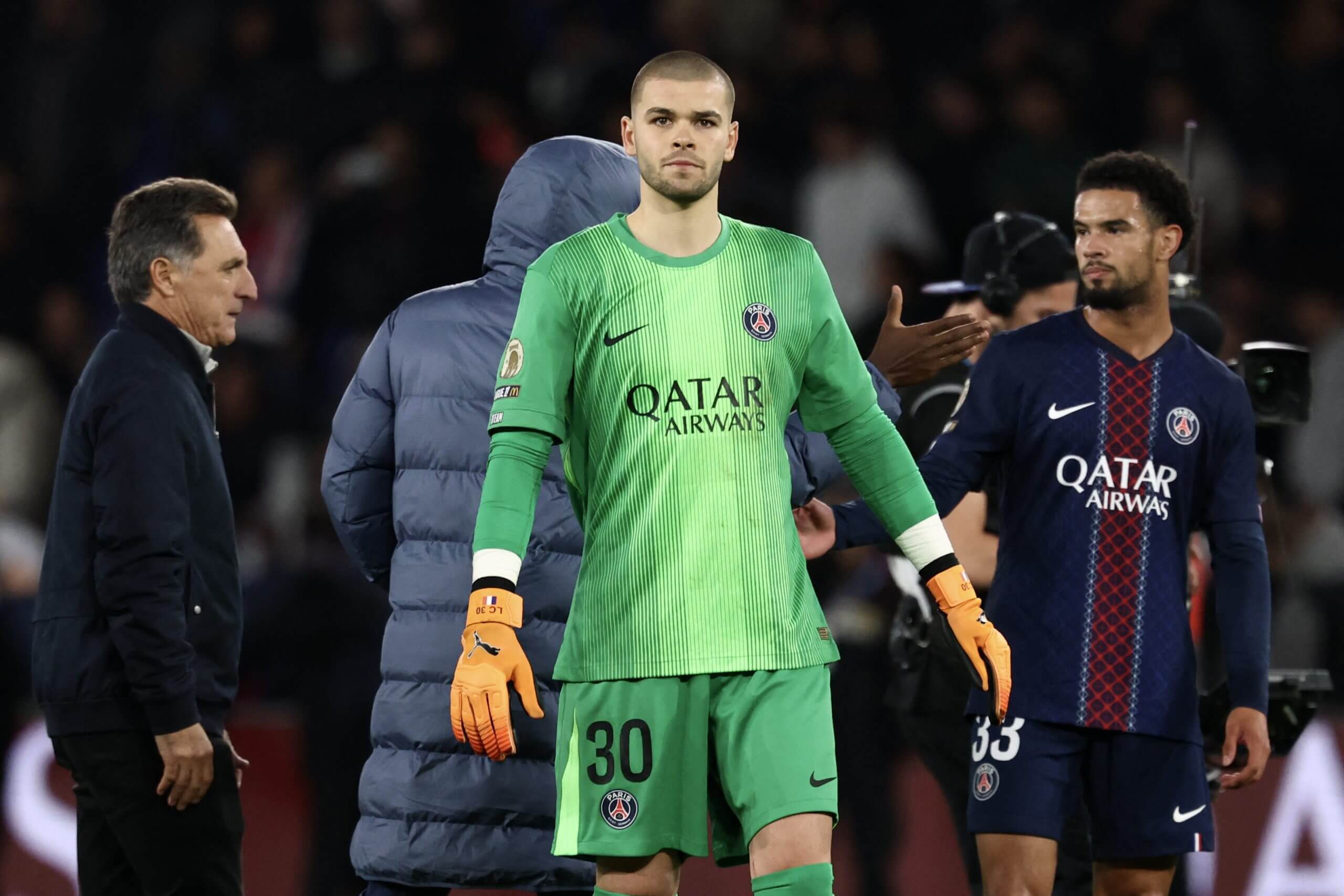
Lucas Chevalier has given PSG a different profile in goal this season (Franck Fife/AFP via Getty Images)
Chevalier, though, has looked average as a shot-stopper at times, the strongest part of Donnarumma’s game, and an area which bailed PSG out a few times en route to winning this competition last season — a double save away at Aston Villa in the quarter-final second leg, a flurry of stops early in the semi-final second leg against Arsenal, and penalty heroics in the round of 16 at Anfield.
Then there is the dynamic at centre-back, where club captain Marquinhos has missed four games because of a dead leg, and five times been an unused sub.
They signed Illia Zabarnyi from Bournemouth in the summer, offering another young, well-rounded profile next to the imperious Willian Pacho.
All in, Luis Enrique has made 45 changes to his Ligue 1 starting XIs, a sign of his confidence to rotate and keep players fresh for Europe, but also out of necessity, with early-season injuries for Dembele and Doue. The former is fit again but the latter is unavailable as a result of a thigh problem.
If anything, the fact the cast changes and the team stays performing might be the biggest sign of their growth under Luis Enrique. His PSG side are the second-youngest in the Champions League this term, already with as many league-phase wins as they managed in 2024-25 (three), while boasting the second-highest possession and number of final-third regains.
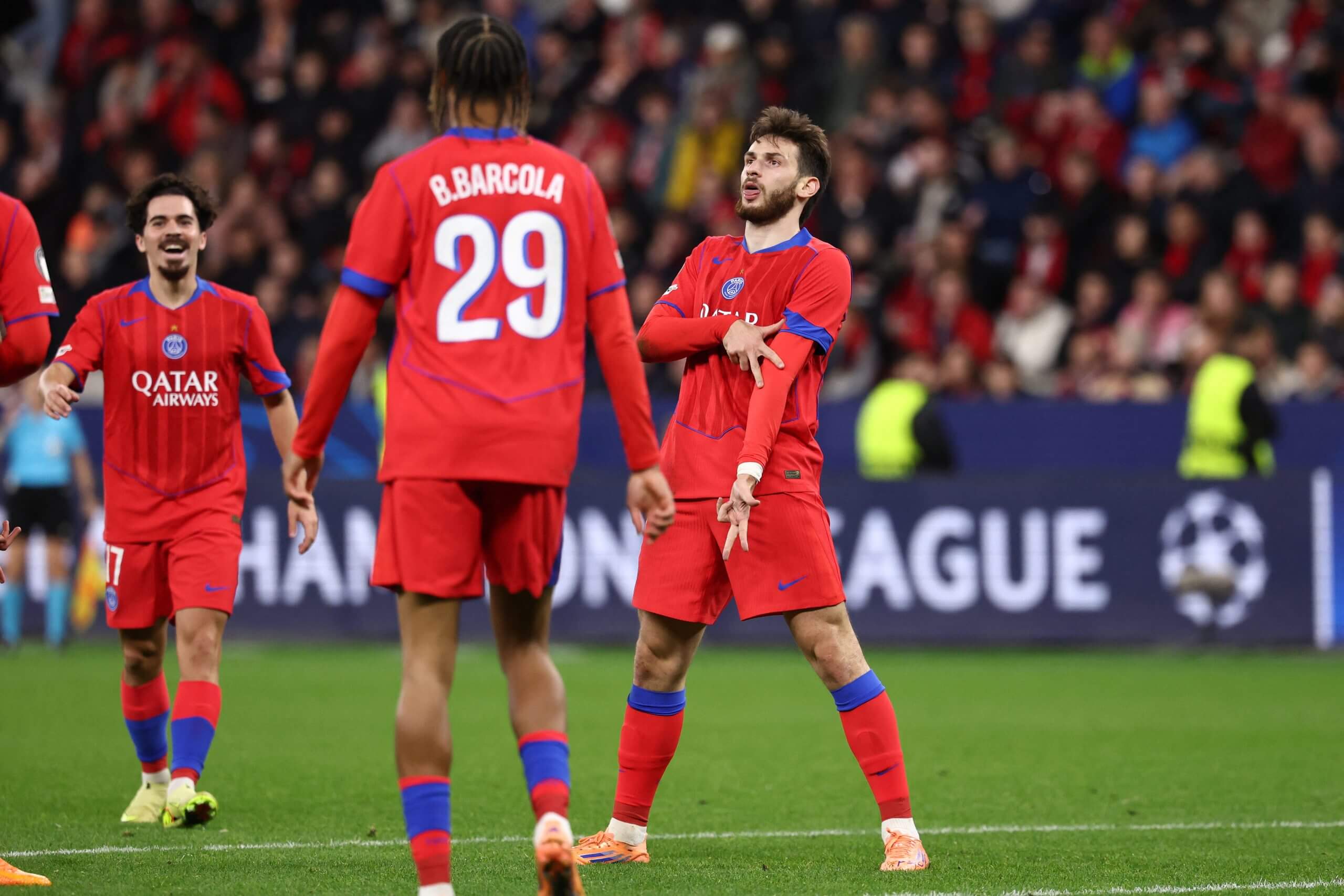
PSG’s defence of their Champions League title has begun well (Franck Fife/AFP via Getty Images)
Liam Tharme
Bayern Munich
A qualifier: perhaps Bayern are the best team in Europe in certain areas of the game? Their football has evolved, becoming more intricate and complex under Vincent Kompany. Fans will tell you that this is the most stylish team they have watched in some time and it is now more than just the sum of its individual components.
Given how much negativity the Kompany hiring attracted in the summer of 2024, who expected to be saying that?
But a lot has gone right, both on the training pitches and in the boardroom.
When Luis Diaz joined over the summer, it was right to be critical of the €75million (£65.6m; $88.1m) deal Bayern struck, given he is 28, but the Colombian was the best multi-position forward available to the club. He is — crucially — similar to Serge Gnabry and Michael Olise in how he likes to roam from his position, but also different in how he actually attacks. Olise floats and creates. Gnabry drives and punches. Diaz is really the midpoint between the two. A direct forward, a goal threat, but one with beguiling technique.
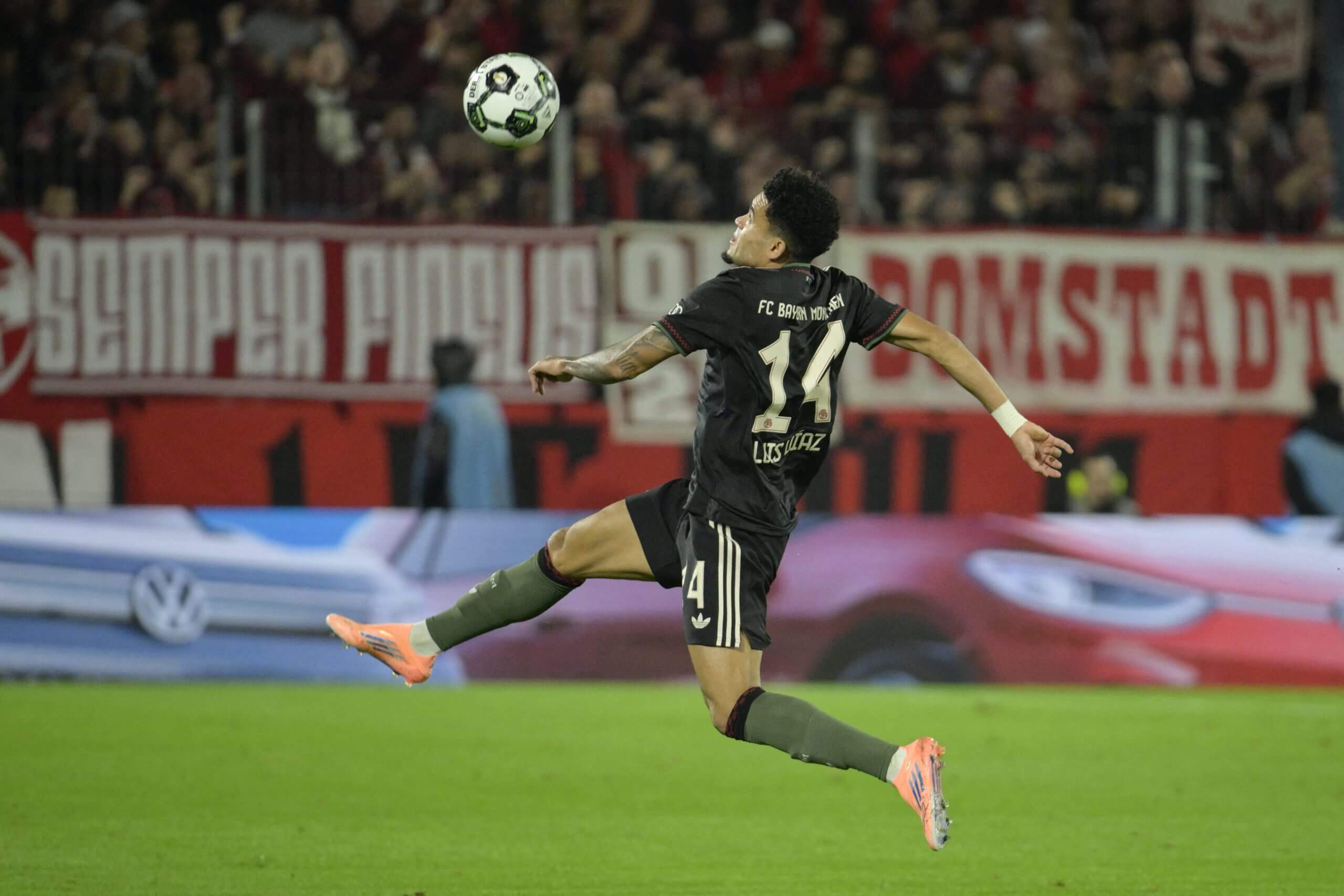
Luis Diaz has been an astute addition (Sascha Scheurmann/AFP via Getty Images)
It’s a balance of targets and playmakers, all in harmony. Orbiting around Harry Kane, now playing arguably the finest football of his career, that amounts to perhaps the most balanced attack in the game. Not the best three individual players, but a group that possesses the biggest threat in the aggregate; 33 goals in nine Bundesliga games this season is testament to that danger.
Bayern’s beauty can distract from their brawn — and perhaps that’s the biggest change overseen by Kompany. At the end of the 2023-24 Bundesliga, when the side was coached by Thomas Tuchel, Bayern finished 17th out of 18 teams for average distance run per game (115.4km). Only Darmstadt were lower. As of matchday nine, they are now second for total distance covered, averaging 122km per 90 minutes.
That helps to explain the excellent defensive record; three goals conceded in the Bundesliga and only one so far in the Champions League. In the seasons before Kompany’s arrival — and arguably during his first year in the job — Bayern’s off-the-ball work was imprecise and uncertain. Now, there’s an accuracy to their pressing which bears comparison to great Bayern teams of the past; their PPDA (passes per defensive action) is the third lowest in the league and only Borussia Dortmund have fashioned more shooting chances from turnovers in the attacking third.
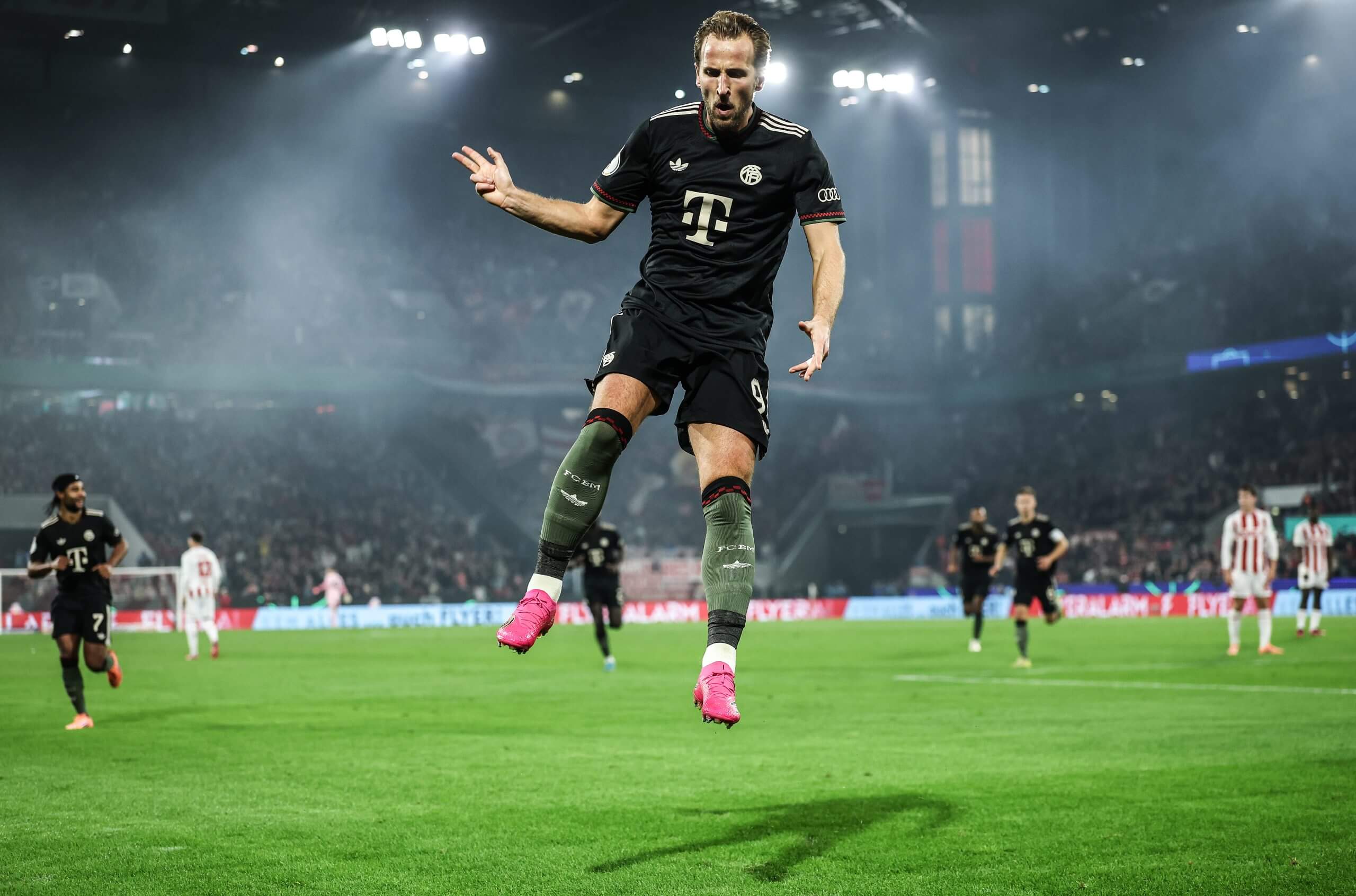
Harry Kane has been in superb form so far this season (Lars Baron/Getty Images)
The quality of this team is in its individuals, but its real virtue resides in its system — and Bayern’s defensive data supports that.
Under Kompany, Dayot Upamecano has become an excellent centre-back and Jonathan Tah is a seasoned international and an ideal partner. Konrad Laimer, hitherto a utility player, has become an outstanding full-back, capable of playing on either side, with the remaining position in the back four filled by one of Josip Stanisic, Sacha Boey or Raphael Guerreiro.
It’s a good group, but not one expected to be quite as stingy as it has been. Bayern are only allowing 1.88 shots on target per league game. The quality of the chances permitted is negligible, too: 0.08xG per shot. Manuel Neuer has barely had to make a save this season.
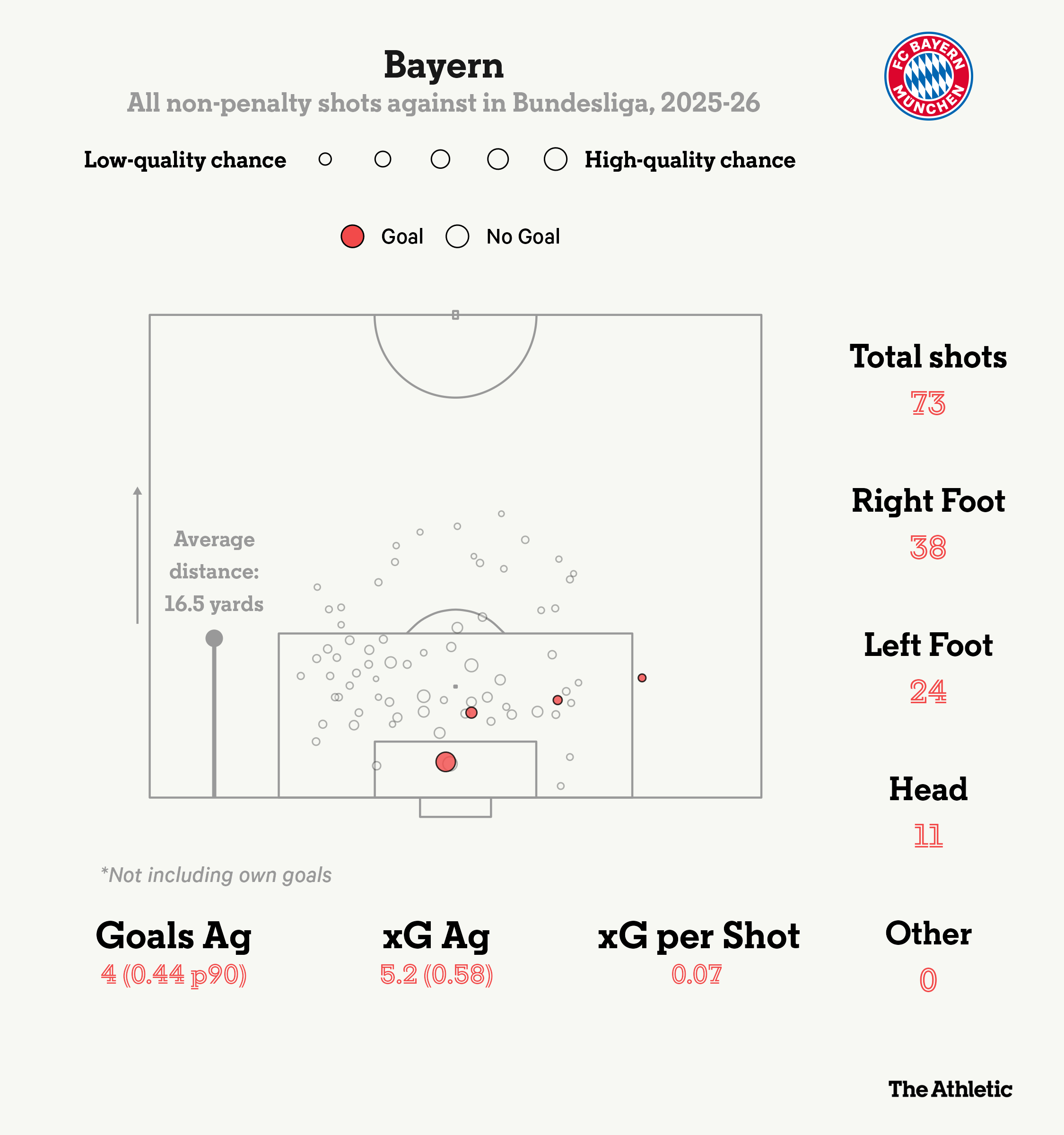
Individually, the players mentioned have all performed well — even Boey, long considered a questionable signing. The triumph, however, is in how well Bayern protect their box and how difficult they have become to play through, and that is very much a 1-to-11 success. As dangerous as Diaz has been in attack and on the counter, for instance, he has been equally valuable for his waspish work out of possession.
So, a dangerous, dangerous side — and that’s before mentioning Joshua Kimmich’s work at its heart, or what Aleksandar Pavlovic and Leon Goretzka can offer, in rotation, alongside him. Bayern are formidable in a way that their dominance of the Bundesliga does not show plainly.
Sebastian Stafford-Bloor

